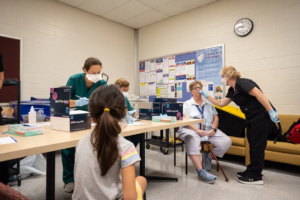Cannabis providers try to navigate a new industry
7 min read
While the New Mexico Regulation and Licensing Department scrambles to fully implement regulations for non-medical cannabis, those who plan to get into the new industry as well as those already in the medical cannabis industry are already trying to navigate proposed rules.
With an April 2022 deadline to have a fully implemented adult-use cannabis program, RLD has posted proposed rules that will be considered on June 29, the same day the recently passed Cannabis Regulation Act goes into effect. But that also means current medical cannabis producers and those industry hopefuls are combing through the proposed rules, watching local zoning proposals and hoping to get the ear of regulators and elected officials.
Matt Muñoz and his business partners are just several of many who are watching the process closely in order to better understand proposed rules and regulations and be prepared to hit the ground running.
Muñoz is finishing his last few weeks of work in the University of New Mexico’s Office of Government & Community Relations while he and his business partners plan for deadlines and shape their business to comply with state regulations. During legislative sessions, Muñoz serves as a lobbyist for the university and he said that work has connected him with lawmakers as well as various department staffers. But he said not everyone has the advantage of knowing who to call with questions or concerns.
“One of the benefits of where I’ve come from with the lobbying world is, I do have those connections,” Muñoz said. “I can help our small business figure this out, but the average New Mexican isn’t going to have that same ability that I have just because I have the connections from being at the Legislature for 10 years.”
Muñoz and his partners already registered their business, Carver Family Farms, with the New Mexico Secretary of State’s office and plan to get a cannabis microbusiness license which would allow them to grow up to 200 cannabis plants. The idea of creating a microbusiness classification was touted by some lawmakers as a pathway for those who want to get into the cannabis industry but don’t plan on mass producing cannabis. And while Muñoz readily acknowledges that getting licensed as a microbusiness is less costly than other avenues, he said he and his business partners will likely end up spending hundreds of thousands of dollars on setting up their business in addition to the few thousand dollars to the state.
“I think the idea that the microbusinesses are going to be able to produce cannabis at a lower barrier of entry is, I don’t want to say it’s a fallacy, but I don’t think it’s completely accurate, because our business plan has the three of us not getting paid until May of next year.”
Superintendent of RLD Linda Trujillo has said that the proposed rules are not set in stone and that some things may change and deadlines may be met early. Muñoz said that fluidity sometimes causes more problems than it helps for small businesses like his.
“I mean, they’re building the airplane as they’re flying it,” Muñoz said. “And I understand that and respect it completely. They have a short timeframe to get this new department up and running.”
Muñoz said while it seems current medical cannabis producers who have been in business, in some cases more than 10 years, those still trying to get a foothold are not consulted.
There are some things in here that they’re talking to the experts about, but they’re not talking to us microbusinesses and other people to see how this is going to affect our business models as we’re trying to get this set up.”
On top of deciphering rules and regulations on the state level, Muñoz and his partners, along with current producers, have their eyes on local zoning ordinance proposals like the one the Albuquerque City Council is considering. Albuquerque Mayor Tim Keller and some members of the city council have dismissed concerns that the proposal would overly restrict where cannabis dispensaries can operate, but Muñoz said he’s still concerned that the City of Albuquerque may end up zoning cannabis businesses more restrictively than liquor stores and bars.
“They should look at [alcohol and cannabis] as equals and not ‘one is worse than the other’ because I think that war on drugs mentality, that pot is still bad, isn’t going to move the industry forward and normalize it,” Muñoz said.
And Muñoz and his partners are far from the only ones who have concerns about the city’s proposal.
Zoned out
The Albuquerque City Council is set to consider a zoning code amendment that, some cannabis producers say, may effectively push current dispensaries out of their current locations. Indy White, president of the New Mexico Cannabis Chamber of Commerce and part owner of cannabis producer PurLife, said part of the proposal that would prohibit dispensaries from being 300 feet from areas zoned as residential could have a significant and negative impact on current medical cannabis producers.
“We’ve seen that that would limit about half of the number of the dispensaries that are currently open from being able to function the way that they currently do, primarily because of that distance from a residential area,” White said.
He added that three of PurLife’s Albuquerque locations might be in “jeopardy” if the current proposal passes without any changes.
During both the regular and special sessions earlier this year, some lawmakers who were hesitant or opposed to cannabis legalization raised concerns that the Cannabis Regulation Act didn’t go far enough in allowing counties and municipalities to essentially zone out cannabis businesses. Those lawmakers argued that some more rural counties may not want legal cannabis sales in their area.
White said he is worried Albuquerque might be setting a precedent for other areas of the state.
“If this is the type of zoning that we’re going to have to deal with, I can only imagine what some other municipalities may feel that they have the liberty to do,” White said.
Duke Rodriguez, the president and CEO of cannabis producer Ultra Health, said he is also worried about Albuquerque’s proposal, especially, Rodiguez said, since the city could benefit the most from cannabis tax revenue.
“I think it’s very disingenuous to have one hand out, looking for these additional receipts that the city of Albuquerque desperately needs and holding a stick in the other hand,” Rodriguez said. “So while it’s only a proposal, I hope that we review that proposal with consideration for all the implications.”
Trying to get it right
White said he and the Cannabis Chamber of Commerce are generally happy with how things are rolling out from RLD and its newly formed Cannabis Control Division, adding that there has been “an open line of communication” with RLD.
White said he’s hoping for more clarification on whether RLD plans to limit cannabis production through plant limits or space limits, or canopy space. He said Trujillo told him and other producers that both canopy limits as well as plant limits were included in the proposed rules as a sort of a placeholder and that the department would get input from stakeholders before deciding on one or the other. White said he personally prefers to see a canopy model instead of plant limits.
Rodriguez has a longer list of concerns than White.
Rodriguez said he is still trying to get clarification on certain aspects of the proposed rules, like whether or not his company will have to fire staff who are between the ages of 18 and 21 in June or next year. The state’s current medical cannabis law allows those 18 years of age or older to work in a dispensary, but the Cannabis Regulation Act raised that age to 21 or older. Rodriguez, who has long been a proponent of raising production limits, if not doing away with them completely, said he is still unclear exactly how the fee structure for larger producers will work. For example, Rodriguez said, there are two different per-plant fee structures: one for medical cannabis and one for non-medical cannabis. But Rodriguez said the rules are unclear as to whether a producer selling both medical and non-medical cannabis would pay both per-plant fees or just the one for non-medical cannabis.
Rodriguez said he’s also seeking clarification on what the maximum fees are. One section of the rules states that no producer will be charged more than $125,000 in fees, but Rodriguez said a producer with 35 locations (Ultra Health has 28) could easily surpass $125,000 in fees.
“I believe that the cap is $125,000,” Rodriguez said. “I’m probably wrong in the eyes of the RLD.”
Rodriguez also said he would like to see the new program up and running before the end of the year.
“My hope is that we consider an April 1 start date for those non-medical sales to be a failure, not a success,” Rodriguez said. “I think we should be patting ourselves on the back if we can make it before the end of calendar year ‘21, and there are sufficient supplies on the shelves of producers and retailers and adult sales have actually been initiated and medical patients have not been compromised, then we can talk about a successful launch.”
This article was originally posted on Cannabis providers try to navigate a new industry







